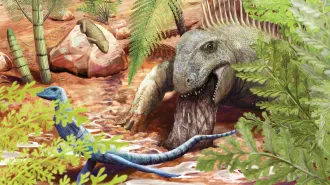Genes & Cells
A new type of intestinal cell is discovered, plus nuclear fallout and a new Parkinson's culprit in this week's news
New intestinal cell
A new type of cell discovered in the lining of the intestine may help control inflammation and can give rise to tumors, a new study finds. Researchers in France have finally developed a method to identify an elusive type of cell called tuft cells in the intestinal lining, the team reports online March 7 in the Journal of Cell Biology. The cells make and secrete opioids, natural pain-killing molecules similar to morphine. Tuft cells are also the only source of two inflammation-related enzymes in the intestinal lining. The researchers also found the cells in early stage tumors in mice and humans. —Tina Hesman Saey

Parkinson’s culprit uncovered
A likely suspect for the killer of brain cells in Parkinson’s disease may have been falsely accused. A wealth of evidence had suggested that when cellular batteries known as mitochondria corrode in dopamine-producing brain cells, the cells commit suicide. But a new study published online March 7 in the Journal of Cell Biology shows that the collapse of structures known as microtubules is really what kills the brain cells. As the microtubules crumble, cells can no longer move proteins and nutrients around, leading to stress, which eventually kills the cells, say researchers at the University of Washington in Seattle. —Tina Hesman Saey
Chemo benefits of nuclear fallout
Low-level radiation — at least in mice — renders individuals more tolerant of anticancer drugs. An international research team gave chemotherapy drugs to mice collected near the site of the 1986 Chernobyl nuclear accident in Ukraine and to others living in a region free of accident-related fallout. Rodents from Chernobyl developed about half as many DNA breaks, a smaller loss of appetite and less bone-marrow poisoning from the toxic cancer drugs than did animals from the radiation-free zone. The data “could have a profound impact on the development of novel cancer treatments involving low-dose radiation,” the scientists conclude in the March Environmental Toxicology and Chemistry. —Janet Raloff







